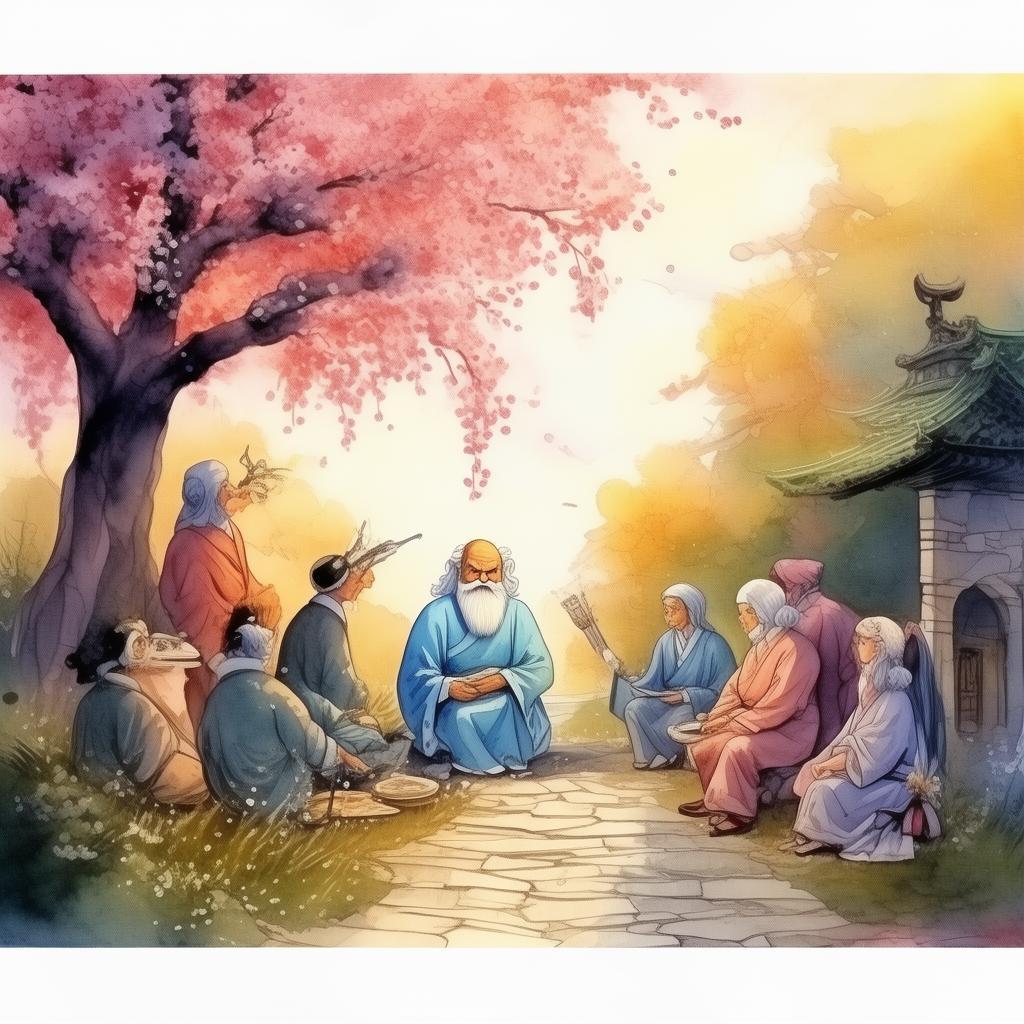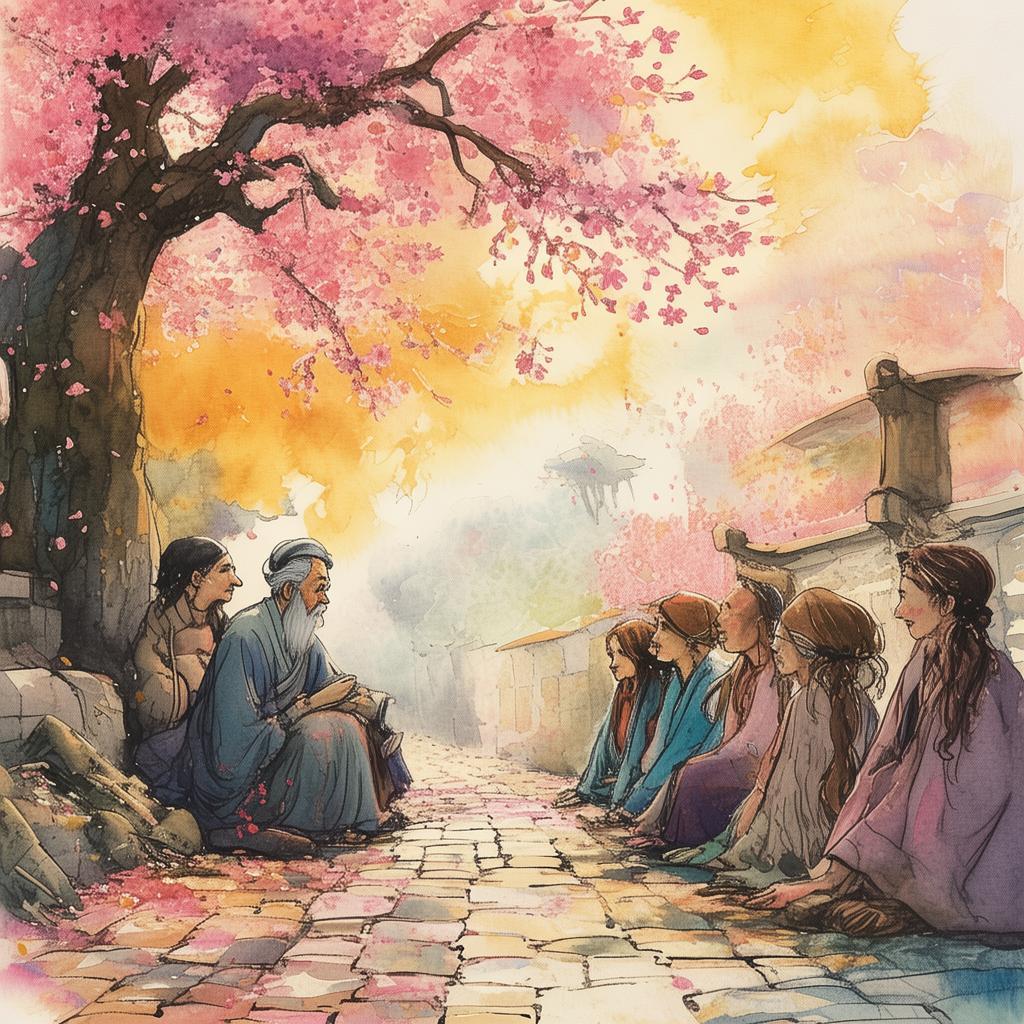The Copycat's Crossroads: A Fork in the Road to Freedom
The village of Longmei was a quaint place, nestled in the embrace of lush green mountains and a tranquil river that meandered through its center. Here lived a young man named Hong, whose life was a canvas painted with the colors of others. He was known throughout the village as "The Copycat," a title he wore with both pride and a sense of irony.
Hong had an uncanny ability to mimic not only the actions of those around him but also their mannerisms and even their emotions. He would observe a person from afar, then, with a flick of his wrist, he would become that person in an instant. It was as if he had a camera in his mind, recording every detail of their lives, and a projector that replayed those images when he chose.

Hong's parents had been proud of their son's talent, believing it was a gift that could bring them prosperity. They had encouraged him to use his abilities to help the village, offering him as a consultant to those in need of advice. Hong, however, felt a growing dissatisfaction with his life. He was living a life of imitation, and he was starting to lose his sense of self.
One day, as he walked along the riverbank, a mysterious old man approached him. The man wore a cloak and had eyes that seemed to pierce through Hong's soul. "Hong," he began, his voice a rumble that seemed to echo in the mountains. "You are standing at a fork in the road, my young friend. One path leads to a life of copying others, while the other leads to a life of freedom."
Hong looked into the old man's eyes and felt a strange mix of fear and curiosity. "What does it mean to copy others?" he asked.
The old man smiled, revealing teeth that seemed to gleam even in the dim light. "Copying others is a way of living without thinking. It's a form of slavery, one that you may not even realize you're under. But if you choose the path of freedom, you will have to find the strength to forge your own path, to make your own choices."
As the old man spoke, Hong felt a weight lift from his shoulders. For the first time, he realized that he was not just a vessel for the lives of others but a unique individual with the power to shape his own destiny.
The next morning, Hong stood at the crossroads once again. Before him were two paths, each lined with people. On one side were the villagers, living lives of quiet routine and contentment. On the other side were the wanderers, their faces marked with adventure and mystery, their eyes full of stories waiting to be told.
Hong hesitated, torn between the path that felt safe and the one that seemed uncertain but full of promise. The old man appeared once more, his cloak rustling as he approached. "Choose wisely, Hong," he said. "Your destiny lies in the direction you take."
With a deep breath, Hong stepped forward. He chose the path of the wanderers, the one that would lead him away from the familiar and into the unknown. The villagers watched as he disappeared into the trees, their eyes filled with concern but also a glimmer of hope.
As Hong ventured deeper into the forest, he encountered people who lived lives of hardship but also of freedom. He learned to fish from the river, to hunt for food, and to survive in the wilderness. He met travelers who told him stories of distant lands and cultures, and he began to dream of places beyond his village.
One day, Hong met a woman who had been traveling for years, her face etched with lines of pain and joy. She spoke to him of a place where people were free to choose their own paths, to pursue their dreams without fear of judgment or rejection.
"Come with me," she said, her eyes full of a hope that seemed to transcend her years of wandering. "We can build a life together, away from the constraints of the village and the burden of copying others."
Hong hesitated again, but this time, he knew what he had to do. "I will come with you," he said. "But first, I must go back and tell the villagers what I've learned."
He returned to Longmei, not as The Copycat, but as Hong, the man who had chosen freedom. He shared his experiences with the villagers, and they listened in awe. Hong spoke of the beauty of the world beyond their village, of the people who had accepted him for who he was, not what he could mimic.
The villagers were inspired by Hong's story, and they began to embrace change. They learned to look beyond the surface of things, to appreciate the unique qualities of each individual. And as they did, they too began to find freedom, to choose their own paths.
Hong and the woman from the forest traveled together, their lives woven together with threads of shared experience and love. And as they journeyed, Hong found that he had become more than just The Copycat. He had become Hong, the man who had chosen freedom, and whose choices had sparked a revolution in Longmei.
In the end, Hong realized that the true essence of freedom was not found in copying others, but in the courage to be oneself, to take risks, and to forge a path that was uniquely his own. And so, he lived, free from the chains of imitation, free to be the man he was meant to be.
✨ Original Statement ✨
All articles published on this website (including but not limited to text, images, videos, and other content) are original or authorized for reposting and are protected by relevant laws. Without the explicit written permission of this website, no individual or organization may copy, modify, repost, or use the content for commercial purposes.
If you need to quote or cooperate, please contact this site for authorization. We reserve the right to pursue legal responsibility for any unauthorized use.
Hereby declared.









